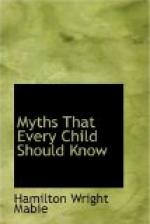It was in this journey, if I mistake not, that he encountered a prodigious giant, who was so wonderfully contrived by nature that, every time he touched the earth, he became ten times as strong as ever he had been before. His name was Antaeus. You may see, plainly enough, that it was a very difficult business to fight with such a fellow; for, as often as he got a knock-down blow, up he started again, stronger, fiercer, and abler to use his weapons than if his enemy had let him alone. Thus, the harder Hercules pounded the giant with his club, the further he seemed from winning the victory. I have sometimes argued with such people, but never fought with one. The only way in which Hercules found it possible to finish the battle was by lifting Antaeus off his feet into the air, and squeezing, and squeezing, and squeezing him until, finally, the strength was quite squeezed out of his enormous body.
When this affair was finished, Hercules continued his travels, and went to the land of Egypt, where he was taken prisoner, and would have been put to death if he had not slain the king of the country and made his escape. Passing through the deserts of Africa, and going as fast as he could, he arrived at last on the shore of the great ocean. And here, unless he could walk on the crests of the billows, it seemed as if his journey must needs be at an end.
Nothing was before him, save the foaming, dashing, measureless ocean. But, suddenly, as he looked toward the horizon, he saw something, a great way off, which he had not seen the moment before. It gleamed very brightly, almost as you may have beheld the round, golden disc of the sun, when it rises or sets over the edge of the world. It evidently drew nearer; for, at every instant, this wonderful object became larger and more lustrous. At length, it had come so nigh that Hercules discovered it to be an immense cup or bowl, made either of gold or burnished brass. How it had got afloat upon the sea is more than I can tell you. There it was, at all events, rolling on the tumultuous billows, which tossed it up and down, and heaved their foamy tops against its sides, but without ever throwing their spray over the brim.
“I have seen many giants, in my time,” thought Hercules, “but never one that would need to drink his wine out of a cup like this!”
And, true enough, what a cup it must have been! It was as large—as large—but, in short, I am afraid to say how immeasurably large it was. To speak within bounds, it was ten times larger than a great mill wheel; and, all of metal as it was, it floated over the heaving surges more lightly than an acorn cup adown the brook. The waves tumbled it onward, until it grazed against the shore, within a short distance of the spot where Hercules was standing.




